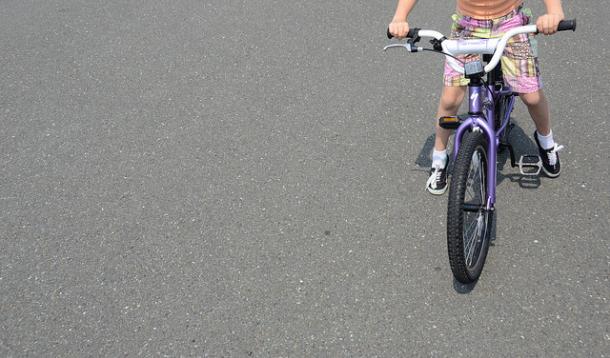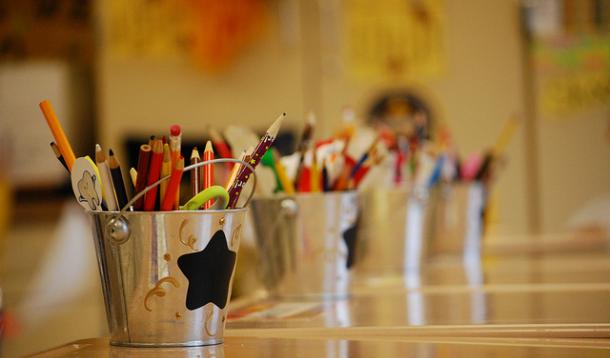
Later this afternoon I am headed to pick up a bike rack for the car. And I'm publicly sharing this mundane errand, why? Because if someone had told me six months ago that we'd need a bike rack fitted to our car, I would have snort-laughed. Bicycle rides - as a family? Impossible. That's something other families do. It's an activity (one of many) I had mentally scratched off as being unrealistic or unachievable for us.
Ever since my son was diagnosed with autism almost five years ago, much of my energy has been devoted to writing and rewriting my family's script. If I wanted to move forward and truly accept him and his difference, I had to take that mental image I had of what our life together would look like, and rip it to shreds. Start from scratch.
And I had pretty done just that when my son unexpectedly won the big raffle prize at his school's spring fair: a shiny new bike. I remember seeing the bike in the main office in the weeks leading up to the fair. All the kids were drooling over it. When my little guy won, they envied him.
The irony was too cruel: he couldn't even ride.
For years I watched much younger neighbour kids race up and down our street with gleeful abandon, resigned to the fact that this was not my son's fate. We had tried to teach him before, and the results were painful to watch. He lacked the coordination to pedal consistently, much less the concentration to keep the handlebars centred.
Then, on a whim (and the shiny new bike gathering dust in my basement) I signed him up to private lessons. After the previous experience, I wasn't expecting much. It probably wouldn't work out. I told myself it didn't matter, and I steeled myself against a disappointment that had come to feel almost inevitable. Any lingering hope I felt was buried deep, lest its glimmer be snuffed out by failure.
After the second lesson, the instructor took off the training wheels - a move I deemed reckless and premature. My son was already nervous; all it would take was one fall for him to swear off biking for the rest of the summer. If you don't want to fall, she told him, you'll have to keep pedalling.
Then she let go.
My heart in my throat, I leapt to my feet in the middle of the empty park. My son pedalled as he'd been told. He didn't fall and he didn't stop.
That day he did the most ordinary, impossible thing because he was ready, even if I wasn't. Although my heart felt like it would burst from pride, it also sank a little: somewhere along the line, I had stopped believing in all the things he could do and instead got hung up on all the things he couldn't do. I had written him off, my amazing, not-so-little-anymore boy.
And now I'm having a bike rack fitted to the car so we can ride together as a family because nothing is ever mundane or impossible.
![]() RELATED: What If I Had Never Become Your Mother?
RELATED: What If I Had Never Become Your Mother?
Image: Rob Bertholf

By the time you read this, schools across the country will be in full swing. Teachers may be easing into a groove with their new students. But for parents of children with special needs, those initial jitters never truly subside. For every great, gifted educator out there, there are countless others who are clueless and incompetent when it comes to teaching our children in the unique way they need to be taught.
When my son started kindergarten not long ago, I was shocked to discover that very few teachers at his school knew a thing about autism, despite its increased prevalence over the past decade. It stands to reason, if you don’t understand what makes a child tick, how can you possibly hope to teach them?
Teachers are overwhelmed with paperwork, so instead of thrusting a dozen books on autism under their noses, why not hand them a cheat sheet? The Cliff Notes of teaching a child on the spectrum, if you will. Any teacher in their right mind would be receptive to information that makes their jobs easier. After all, if educators use the right tools, kids will be more responsive and well behaved. IEPs are fine and dandy. But few are worth more than the paper they are written on, and any education plan worth its salt should include all aspects of a child’s education, including socio-emotional learning.
The following five pointers, inspired from School Success for Kids with Autism*, will arm your child’s teacher with the hacks they need to get the best out of your child:
While many of us scoff at the idea of “bribing” kids to comply, consider this: would you work indefinitely for no paycheque? We all need the dangling carrot in some form or other. Whether it’s working for iPad time, a special toy or treat, reinforcement is a powerful motivator if used in a positive (i.e. not punitive) way. By rewarding and praising the behaviours you want to see, you will elicit more of the same. The knack here is to restrict access to the reinforcer at other times and to source another reward as soon as the current one loses its lustre.
Kids on the spectrum are known for being passionate about their interests. When teachers and parents are looking for reinforcers, they need look no further than interests. What kids gravitate to in free play is a good indication of what will motivate them to learn. Educators should harness that passion and make it work for them. Whether it’s Pokémon or trains, lessons should tie in special interests insofar as possible, whether it’s rewording math problems or using themed stickers. Where our kids always seem to be lagging behind others socially, it can be a huge confidence boost to let them talk to the class about their area of expertise!
Even the most literate child with autism tends to be a visual thinker. Schedules are essential for helping kids navigate inherent difficulties with organization and transitions. It needn’t be fancy PECS, but some form of schedule is a must-have if the ultimate goal is self-sufficient, independent kids. Knowing what comes next offers a huge amount of comfort and control to kids who tend to be overwhelmed and anxious. Educators must give kids progressive countdowns before transitions as well as ample warning of any changes and adjustments to the day’s events.
When challenging behaviours are exhibited in school, keeping a log is critical. Kids with autism act out and a lot of behaviour can look random. It’s not. Keeping a careful note of what happened immediately before and immediately after the behaviour will often reveal interesting patterns over time. Bear in mind that sensory factors can play a huge part in triggering reactions. And behaviours serve many purposes, from escape to attention. Putting a child in time-out when they are melting down can actually reinforce the behaviour if a child was trying to avoid a certain task. Once the function of a behaviour has been established, the focus should be on offering positive alternatives.
For kids with autism, arguably the most important part about going to school is not contained in books; it’s what’s all around them - people. The hallmark of autism is a kind of social blindness, and the most vital lessons for kids involve interpersonal skills. Teachers should factor in social learning as often as possible. This can take many forms, from writing social stories for specific skills like greetings and turn-taking, to implementing a rotating buddy system. Teachers should put careful thought into pairing children who will gel. This is the beauty of true inclusion: the neurotypical kid gets to know a child he may not have otherwise hung out with, and he may have a great knack for “teaching the ropes” to the autistic child. In an ideal world, such an arrangement would mean no child was ever left sitting alone at lunch or aimlessly wandering the playground.
And beyond learning ABCs and 123s, this is the dream most parents dream for their children when we send them off to school each day.
* In the interest of full disclosure, I was given a review copy of this book. Since my son headed into grade 3 this year, the points above are aimed at elementary-aged students, but it’s worth noting School Success also has dedicated chapters to preschool, middle, and high school.
Image: Nick Amoscato
![]() RELATED: Top 5 Autism Books for Kids
RELATED: Top 5 Autism Books for Kids